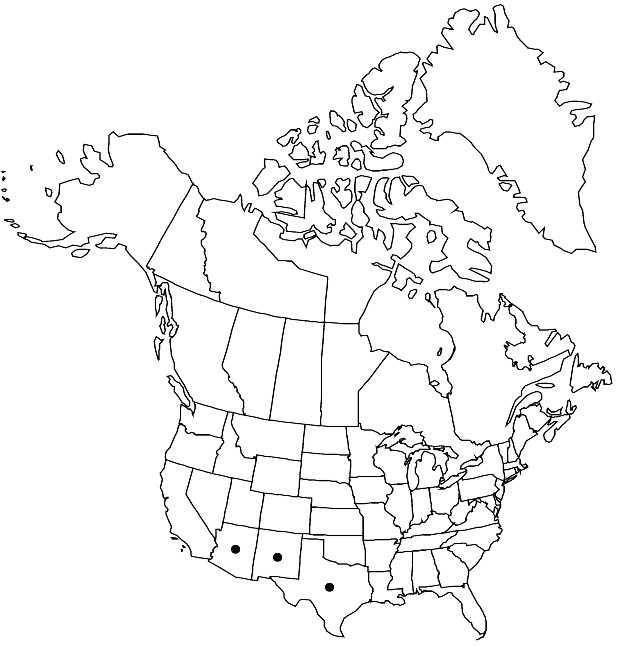Difference between revisions of "Physaria purpurea"
Novon 12: 327. 2002.
FNA>Volume Importer |
imported>Volume Importer |
||
| (5 intermediate revisions by 2 users not shown) | |||
| Line 8: | Line 8: | ||
}} | }} | ||
|common_names=Rose bladderpod | |common_names=Rose bladderpod | ||
| − | |basionyms={{Treatment/ID/ | + | |basionyms={{Treatment/ID/Basionym |
|name=Vesicaria purpurea | |name=Vesicaria purpurea | ||
|authority=A. Gray | |authority=A. Gray | ||
| + | |rank=species | ||
| + | |publication_title=Smithsonian Contr. Knowl. | ||
| + | |publication_place=5(6): 14. 1853 | ||
}} | }} | ||
|synonyms={{Treatment/ID/Synonym | |synonyms={{Treatment/ID/Synonym | ||
|name=Lesquerella purpurea | |name=Lesquerella purpurea | ||
|authority=(A. Gray) S. Watson | |authority=(A. Gray) S. Watson | ||
| + | |rank=species | ||
}} {{Treatment/ID/Synonym | }} {{Treatment/ID/Synonym | ||
|name=Lesquerella purpurea subsp. foliosa | |name=Lesquerella purpurea subsp. foliosa | ||
|authority=(Rollins) Rollins & E. A. Shaw | |authority=(Rollins) Rollins & E. A. Shaw | ||
| + | |rank=subspecies | ||
}} {{Treatment/ID/Synonym | }} {{Treatment/ID/Synonym | ||
|name=Lesquerella purpurea var. foliosa | |name=Lesquerella purpurea var. foliosa | ||
|authority=Rollins | |authority=Rollins | ||
| + | |rank=variety | ||
}} {{Treatment/ID/Synonym | }} {{Treatment/ID/Synonym | ||
|name=Physaria purpurea var. foliosa | |name=Physaria purpurea var. foliosa | ||
|authority=(Rollins) B. L. Turner | |authority=(Rollins) B. L. Turner | ||
| + | |rank=variety | ||
}} | }} | ||
|hierarchy=Brassicaceae;Brassicaceae tribe Physarieae;Physaria;Physaria purpurea | |hierarchy=Brassicaceae;Brassicaceae tribe Physarieae;Physaria;Physaria purpurea | ||
| Line 47: | Line 54: | ||
-->{{#Taxon: | -->{{#Taxon: | ||
name=Physaria purpurea | name=Physaria purpurea | ||
| − | |||
|authority=(A. Gray) O’Kane & Al-Shehbaz | |authority=(A. Gray) O’Kane & Al-Shehbaz | ||
|rank=species | |rank=species | ||
| Line 62: | Line 68: | ||
|publication year=2002 | |publication year=2002 | ||
|special status= | |special status= | ||
| − | |source xml=https:// | + | |source xml=https://bitbucket.org/aafc-mbb/fna-data-curation/src/2e0870ddd59836b60bcf96646a41e87ea5a5943a/coarse_grained_fna_xml/V7/V7_1120.xml |
|tribe=Brassicaceae tribe Physarieae | |tribe=Brassicaceae tribe Physarieae | ||
|genus=Physaria | |genus=Physaria | ||
Latest revision as of 22:30, 5 November 2020
Perennials; caudex simple, (usually woody); densely pubescent, trichomes (sessile or short-stalked), several-rayed, rays simple or furcate, (smooth or tuberculate). Stems simple from base, erect, (unbranched, sparsely leaved), to 7 dm. Basal leaves: blade elliptic or obovate to oblong, 4–15 cm, margins entire, dentate, or lyrate-pinnatifid. Cauline leaves: (proximal often narrowed to short petiole, distal sessile); blade broadly elliptic to obovate or rhombic, 0.5–3(–5) cm, margins entire. Racemes dense or slightly elongated. Fruiting pedicels (spreading or recurved, loosely sigmoid), 5–25 mm. Flowers: sepals elliptic to ovate, 3.5–6(–7) mm, (median pair usually thickened apically, cucullate); petals (white, often purple-veined, fading purplish), suborbicular to obovate, obdeltate, or cuneate, 4.5–10(–12) mm, (often narrowed to broad claw, apex emarginate, less frequently claw undifferentiated from blade). Fruits (pendent or horizontal, sessile or substipitate), subglobose to broadly ellipsoid, not or slightly inflated, (4–)5–8 mm; valves (not retaining seeds after dehiscence), glabrous throughout; replum as wide as or wider than fruit; ovules 4–8(–12) per ovary; style 1–3(–4) mm. Seeds flattened. 2n = 18, 36.
Phenology: Flowering Mar–Oct.
Habitat: Rocky draws, canyons, stony hills, ridges, rock crevices on limestone ledges, lava cliffs, sand and gravel of dry stream beds, rocky slopes, talus, shade of bushes or cactus clumps
Elevation: 400-2400 m
Distribution

Ariz., N.Mex., Tex., Mexico (Chihuahua, Coahuila, Sonora).
Discussion
Selected References
None.